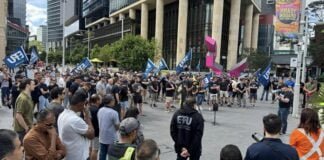Over two million workers struck across Indonesia on Thursday and Friday last week. The workers want a 50 per cent wage rise as well as healthcare and an end to contract work and outsourcing.
“Long live the workers” rang out throughout the industrial areas as workers shut down production, blocked toll roads and surrounded government offices.

A similar strike last year resulted in massive wage increases. In Jakarta the minimum wage was increased by 44 per cent.
Workers in Indonesia face shockingly low wages and are forced to cope with high inflation of over 8 per cent and major price rises.
According to Dhaffa Syahida Yusuf, who works in construction on the industrial island of Batam, “If we hadn’t held a national strike last year our wages might still have been below Rp 2 million [$190] a month”.
“Since the experience of the 2012 National Strike we are stronger and more united now.”
The national strike this year was preceded by three days of “warm-up” actions in which around 80,000 workers took to the streets.
On Tuesday thousands of workers in Jakarta surrounded the office of the Governor of Jakarta, Jokowi.
Previously incredibly popular, workers are now furious at Jokowi’s refusal to increase workers’ wages as demanded. Jokowi has announced only a 9 per cent wage rise for workers in Jakarta.
“He says he is pro the people and pro the poor, but he is the one that is making the people poor”, said Alang Fatahillah from the union Progresip.
On Wednesday further mass actions took place. Again workers in Jakarta led the way, managing to interrupt the meeting of the council that decides the new minimum wage for Jakarta. The minimum wage is based on a calculated cost of living (KHL).
“The KHL is far below what is needed for a reasonable life”, stated Yusuf.
“If we want to send our children to school it’s expensive and it means we have to rent a place that is small and dirty. If we want to buy a house, we and our families have to starve. And if we want to eat, well then we have to sacrifice our children’s education. That’s the life of a worker.”
On top of that, a 44 per cent rise in the cost of fuel this year has really hit the working class.
Yusuf explained that, “the cutting of the fuel subsidy has inflicted a real hardship on poor people. It has caused the prices of basic goods to soar.”
National strike
On Thursday and Friday industrial areas were paralysed as workers stopped production and spilled out of factories to join the strike.
The majority of the workers are on precarious contracts or are outsourced workers, but this has only encouraged them to take action.
Some of the workers have also been fired in recent years because of their union activity, but still joined the strikes.
45 year Aisah, who used to work in a factory producing picture frames said, “I joined the strike even though I’ve been sacked. I invited all my friends too because I want a better life.”
Despite the success of the 2012 national strike in increasing wages some union confederations were reluctant to support the strike this year.
“Some of the leaders of the major unions like SPSI didn’t want their members to strike but their members did anyway. Some workers even asked us to do ‘sweeping’ at their workplaces so that they could come join the strike with us”, said Alang. Sweeping is a tactic where striking workers visit other workplaces and sweep through to bring other workers out on strike.
Repression
However workers’ demonstrations were met with heavy repression. Thousands of thugs hired by employers and the police and army attacked strikers. Dozens of workers had to be taken to hospital. Some are in a critical condition.
At some factories workers were locked out by employers. Qory Dellasera, from the socialist organisation KPO PRP reported that “There were factories that even locked their employees inside the gates and wouldn’t let them out to join the strike.”
On Friday regional governments began announcing the new wages. A presidential decree and pressure from the capitalists has meant that most have not increased wages by more than 10-30 per cent. This has sparked outrage.
At a meeting of union leaders on Friday it was agreed that the workers would return to the streets in coming days to continue the struggle.
Yusuf concluded, “If the demands aren’t met of course we will strike again. We will continue striking and demonstrating until our demands are met”.
By Vivian Honan





